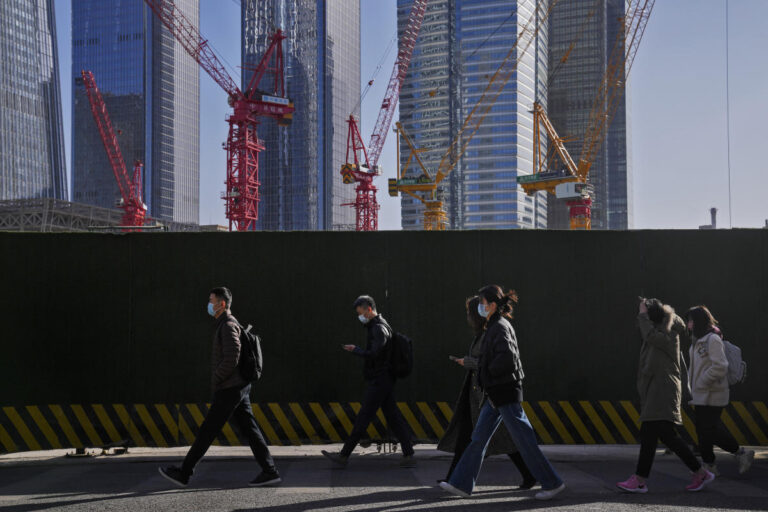BANGKOK (AP) – Chinese leaders rolled out a flurry of new policies this week to shore up struggling financial markets and reignite growth in the world's second-largest economy.
The move to support lending and spending with billions of dollars in new cash accelerated after the central bank lowered bank reserve requirements and issued new rules forcing banks to lend more to real estate companies.
The collapse of China's real estate market has become one of the main factors hindering the country's recovery from the shock of the COVID-19 pandemic. At stake are stable financial markets and key drivers of global economic growth.
How is the Chinese economy?
China's economy will grow at an annual rate of 5.2% in 2023, exceeding government targets, and many indicators, including factory production and retail sales, are showing signs of improvement. But most economists expect a slowdown this year and next to drag on the global economy. Meanwhile, China's stock market has been in free fall since the end of 2023, compounding losses reaching trillions of dollars over the past few years. The real estate downturn, job losses and other challenges caused by the coronavirus pandemic are making consumers cautious with their spending. The situation, some economists say, could lead to a deflationary spiral, with prices for housing and other goods falling and inhibiting investment that would create jobs and fuel a stronger economic recovery.
Why are China's leaders acting now?
A weak economy and a crackdown on the technology industry, as well as disruptions caused by the pandemic and trade tensions with the United States, have made foreign investors wary of China's economic outlook. Premier Li Qiang chaired a State Council meeting this week and said more needs to be done to “stabilize the market and boost confidence.” Speaking at the World Economic Forum in Davos, Switzerland, last week, he tried to sell investing in China as an “opportunity, not a risk.”
A vital priority is to ensure growth is fast enough to create enough jobs for young people leaving school. China's youth unemployment rate skyrocketed in 2023, hitting a record of over 21%. It has since fallen to around 15%, but remains dangerously high and there is an urgent need to get growth back on track.
What is the government doing?
The People's Bank of China plans to reduce the ratio of reserves held on behalf of banks by 0.5 percentage points from February 5th. People's Bank of China Governor Pan Gongsheng said this would free up an additional 1 trillion yuan ($140 billion) of capital. The central bank also issued new regulations aimed at lowering interbank interest rates and expanding access to commercial bank financing for real estate developers. Until the end of the year, real estate companies will be allowed to use bank loans secured by commercial properties such as offices and shopping malls to repay other loans and corporate bonds. Earlier, regulators lowered mortgage rates and lifted restrictions on real estate purchases. State-run institutional investors were reportedly ordered to buy shares after the stock price plunged.
Why is the real estate crisis such a big issue?
After the government cracked down on the industry's excessive borrowing several years ago, dozens of developers defaulted on their debts. The largest, China Evergrande, is still working to resolve more than $300 billion in debt, and a Hong Kong court is scheduled to hold a hearing on its restructuring plan next week.
It is unclear how the new policy will affect the overall crisis hitting the real estate market. Land sales have been a major source of income for local governments for many years, and they are currently saddled with large amounts of debt. At the same time, construction of new homes has slowed, hurting contractors and suppliers of construction materials and furniture. It wiped out countless jobs and rippled through the economy. Chinese families tend to lock up much of their wealth in real estate, causing new home sales and home prices to fall, discouraging consumer spending. The industry as a whole accounts for more than a quarter of China's business activity.
What impact will the measures taken so far have on the public?
As China's rapid rise as an economic power loses momentum, foreign investors and consumers are watching for signs that the Chinese government has a clear strategy to guide the economy through a period of low growth.
Many analysts said moves to pump more money into the economy and boost bank lending may not go far enough. Reducing required bank reserves would free up more credit, but “doesn't address the underlying problem. So you can lead a horse to water, but you can't make it drink.” said Stephen Innes of SPI Asset Management in a report. Economists say long-term reforms are needed to maintain strong growth, including creating better social safety nets to help families spend their rainy-day savings rather than putting them in banks. I tend to agree. Too much of the country's wealth is still spent building infrastructure such as roads and railways, and policy uncertainty prevents investment in the small and medium-sized businesses that create the most jobs.


